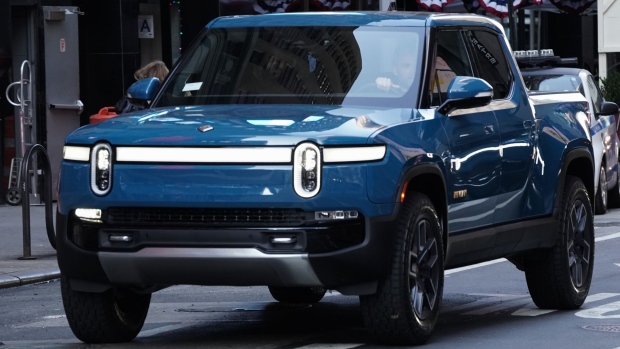Jan 26, 2022
Rivian Is Ramping Production of Pickups After Late 2021 Woes
, Bloomberg News

(Bloomberg) -- Rivian Automotive Inc. is ramping up output of its debut electric vehicle toward almost 200 delivery-ready units a week after working through production snags, according to people familiar with the matter, gaining traction after missing its goals in 2021.
The pickup maker backed by Amazon.com Inc. had paused production at its Normal, Illinois, plant for about a week around the start of this month for fixes and process improvements, said the people, who asked not to be identified discussing private information.
After starting limited production of its R1T pickup in August, Rivian averaged about 50 units a week through the end of December. That rate has fluctuated, with the number dropping significantly lower at points last month amid Covid-19 outbreaks at the plant and supply-chain bottlenecks, the people said.
News of the production boost sent Rivian’s shares up as much as 14% Wednesday in New York, the biggest intraday gain since November. The stock was up 9.7% to $65.37 a share at 12:45 p.m.
While the accelerated rate this year is a sign of progress, it will depend on Rivian’s success in honing manufacturing processes and navigating the supply-chain disruptions.
The company’s EVs have been hotly anticipated as genuine competition to market incumbent Tesla Inc., in part because they are bigger, bulkier and more aligned with the gas cars Americans drive today. Backed by a stellar list of investors, Rivian’s public listing in November was the biggest of the year and the sixth-biggest IPO in U.S. history.
The stock soared to more than $170 a share in the days following the debut, but has since come crashing back to Earth, losing about two-thirds of its value and falling below its IPO price.
One catalyst for the decline was an admission during its quarterly earnings in December that production would fall “a few hundred vehicles short” of its goal to make 1,200 EVs by the end of the year. Rivian said earlier this month it ended 2021 having produced 1,015 vehicles and delivered 920.
Chief Executive Officer R.J. Scaringe cited challenges ramping up and supply-chain issues.
SUV Slows Flow
Output of the truck was slowed in part by the start of production on the same line for Rivian’s second vehicle, the R1S SUV, according to people familiar with the matter. While some salable R1S units have been built, the company still has some pre-production work to complete on the SUV, the people said. Rivian also had to manage through Covid-19 outbreaks in the plant, the people said.
Rivian also is working on an all-electric delivery van for Amazon, which is produced on a separate assembly line. Rivian is due to deliver 10,000 of these vans by the end of this year and 100,000 to complete the order by the end of the decade.
Tesla also struggled to launch and ramp up production of its first mass-market consumer car, the Model 3, while already selling the more expensive, lower-volume Model S sedan. After falling well short of its 2017 targets for the Model 3, Tesla CEO Elon Musk said the company was stuck in “production hell.”
Rivian is expected to tread a similar path. However, the company counts a number of Tesla alumni in senior and middle management who are determined to avoid a repeat of the mistakes made in Tesla’s Fremont, California, factory, Bloomberg has reported. Other issues have been fairly typical of a product ramp, such as irregular cadence of key parts being available for the line and quality control checks taking time at the other end, some of the people said.
Rivian’s Normal facility will be capable of producing 150,000 EVs a year by 2023, the company has said, with plans to increase capacity to 200,000 vehicles annually. In December, Rivian announced a second EV plant will be built in Georgia that will eventually be able to produce an 400,000 vehicles annually. Production is expected to start in 2024.
(Updates with share gain in fourth paragraph)
©2022 Bloomberg L.P.





